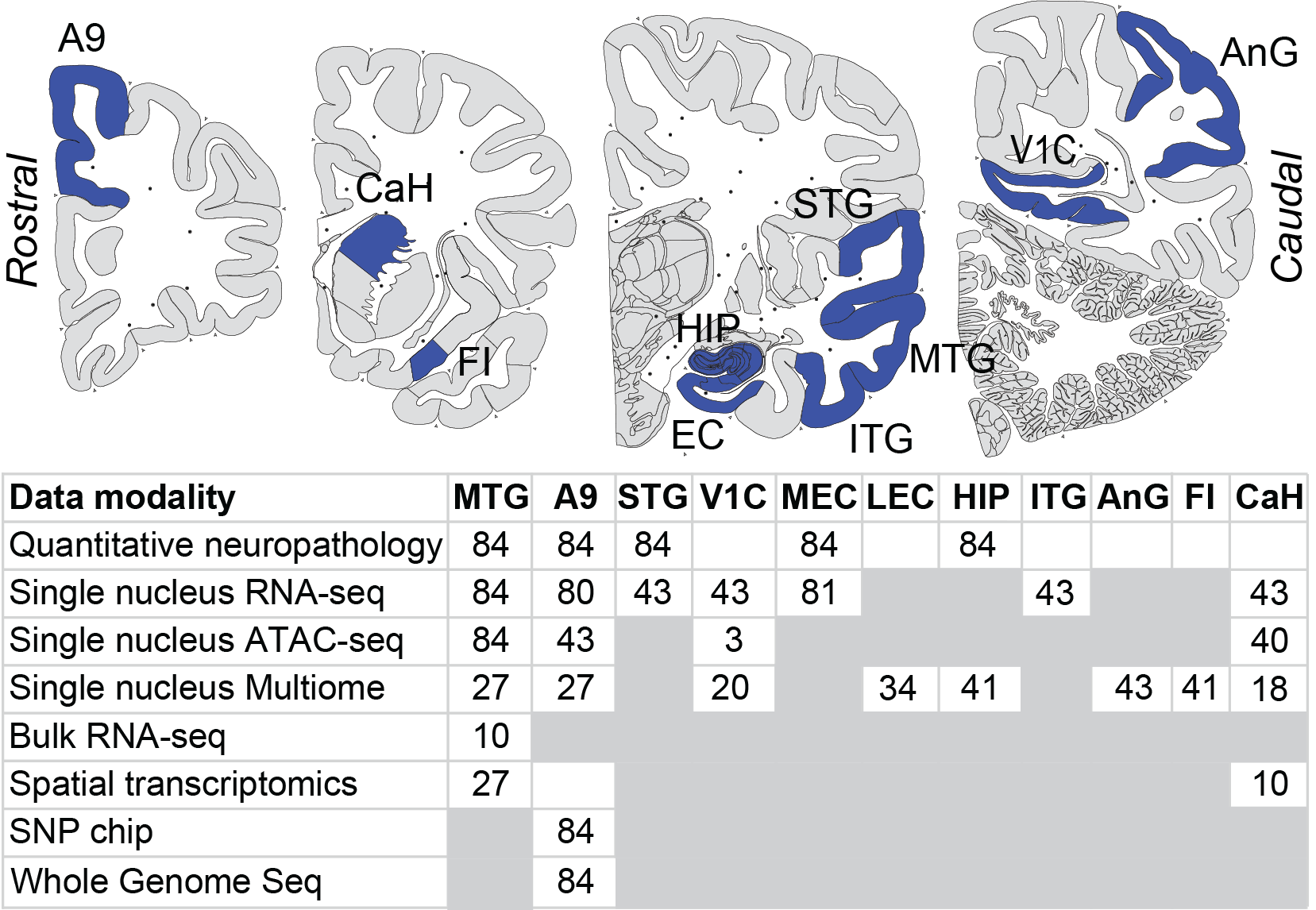
About SEA-AD
This repository is under review for potential modification in compliance with Administration directives.
What is SEA-AD?
The Seattle Alzheimer’s Disease Brain Cell Atlas (SEA-AD) consortium strives to gain a deep molecular and cellular understanding of the early pathogenesis of Alzheimer’s disease. We provide free, open resources to the scientific community.
Our approach
SEA-AD aims to build a detailed map of brain cell types in aging and AD. This map will help us understand how the disease affects different cell populations and brain regions. To achieve this, SEA-AD is using advanced techniques to analyze brain tissue samples from carefully selected individuals with varying degrees of AD pathology. These approaches include:
- Next-generation single-cell molecular profiling technologies developed through the BRAIN Initiative Cell Census/Atlas Network (BICAN/BICCN) and at the Allen Institute for Brain Science.
- Application of spatial transcriptomic methods to Alzheimer's-affected tissue sections to define the spatial distribution of vulnerable cell types and reveal the impact on the structural and functional organization of tissue and circuit microarchitecture.
- Integrating single-cell profiling technologies with quantitative neuropathology and deep clinical phenotyping via collaboration with the University of Washington Alzheimer's Disease Research Center (ADRC) and Kaiser Permanente Washington Health Research Institute (KPWHRI).
Outputs of SEA-AD include manuscripts summarizing scientific findings, modified reference cell type taxonomies, and tools, data, and resources for exploration of our work that are freely available to the AD community.
SEA-AD Cohort

SEA-AD selected a high-quality donor cohort, spanning the full spectrum of AD pathology, chosen from prospective longitudinal cohort studies with well-characterized participants. SEA-AD cohort was derived from longitudinally characterized research brain donors from the community-based Adult Changes in Thought (ACT) study and University of Washington Alzheimer's Disease Research Center (ADRC).
Highlights of SEA-AD cohort
-
Range of pathological levels: 9 No AD, 12 Low, 12 Intermediate, 42 High ADNC (Alzheimer's Disease Neuropathologic Change score)
-
50% no dementia, 50% dementia
-
Age of death, 65 - 102, mean: 88
-
51 females, 33 males
-
Years of education: 12 - 21
-
Extensive metadata (APOE genotype, Braak stage, CERAD score, Thal stage, 20+ more)
For more information on ACT study donors, please contact KPWA.actproposals@kp.org
For more information on ADRC donors, please contact uwadrc@uw.edu
Brain Regions Assayed
Most data and resources, and our initial manuscript focus on middle temporal gyrus (MTG), with additional data and select resources targeting additional brain structures.

Values indicate the number of SEA-AD donors. Note that snOmics data from 3-5 reference donors is also available for most regions. White boxes denote data being collected but not yet available, while gray boxes denote no data collection planned. Abbreviations: MTG, middle temporal gyrus; A9 (also called PFC), prefrontal cortex; STG, superior temporal gyrus; V1C, primary visual cortex; MEC/LEC/EC, medial/lateral entorhinal cortex; HIP, hippocampal formation; ITG, Inferior Temporal Gyrus; AnG, angular gyrus; FI, frontoinsular cortex; CaH, head of the caudate nucleus.
Data Modalities Used
SEA-AD utilizes advanced technologies and best practices for studying human brain from the BRAIN Initiative to produce the highest-resolution, multimodal brain-wide cell atlas of AD mapped to the BICCN foundational references.
Data modalities include:
- Exquisite characterization of cohort donors, including demographics, disease metrics, and postmortem MRI volumetrics
- Quantitative image-based neuropathology for markers of pathology and cell types
- Single nucleus RNA-seq, ATAC-seq, and Multiome (RNA-seq + ATAC-seq) with high coverage of nuclei and reads per sample - 36,266 genes evaluated
- Targeted spatial transcriptomics using MERFISH - 140 genes evaluated
- Characterization of disease variants using SNP chips and whole genome sequencing
The Seattle Alzheimer's Disease Brain Cell Atlas (SEA-AD) consortium is supported by the National Institute on Aging (NIA) grant U19AG060909.
Study data were generated from postmortem brain tissue obtained from the University of Washington BioRepository and Integrated Neuropathology (BRaIN) laboratory and Precision Neuropathology Core, which is supported by the NIH grants for the UW Alzheimer's Disease Research Center (NIA grants: P50AG005136 and P30AG066509) and the Adult Changes in Thought Study (NIA grants: U01AG006781 and U19AG066567).
The ACT study is a longitudinal population-based prospective cohort study of brain aging and incident dementia in the Seattle metropolitan area. ACT is a repository at the Kaiser Permanente Washington Health Research Institute, which has established policies and procedures for sharing data with external investigators. Data available from this study web site do not require any additional Institutional Review Board (IRB) approval or permissions. Linking those data with other ACT study or Kaiser Permanente Washington data would require additional review. All of those steps are initiated after contacting KPWA.actproposals@kp.org.
Your browser is out-of-date!
Update your browser to view this website correctly.